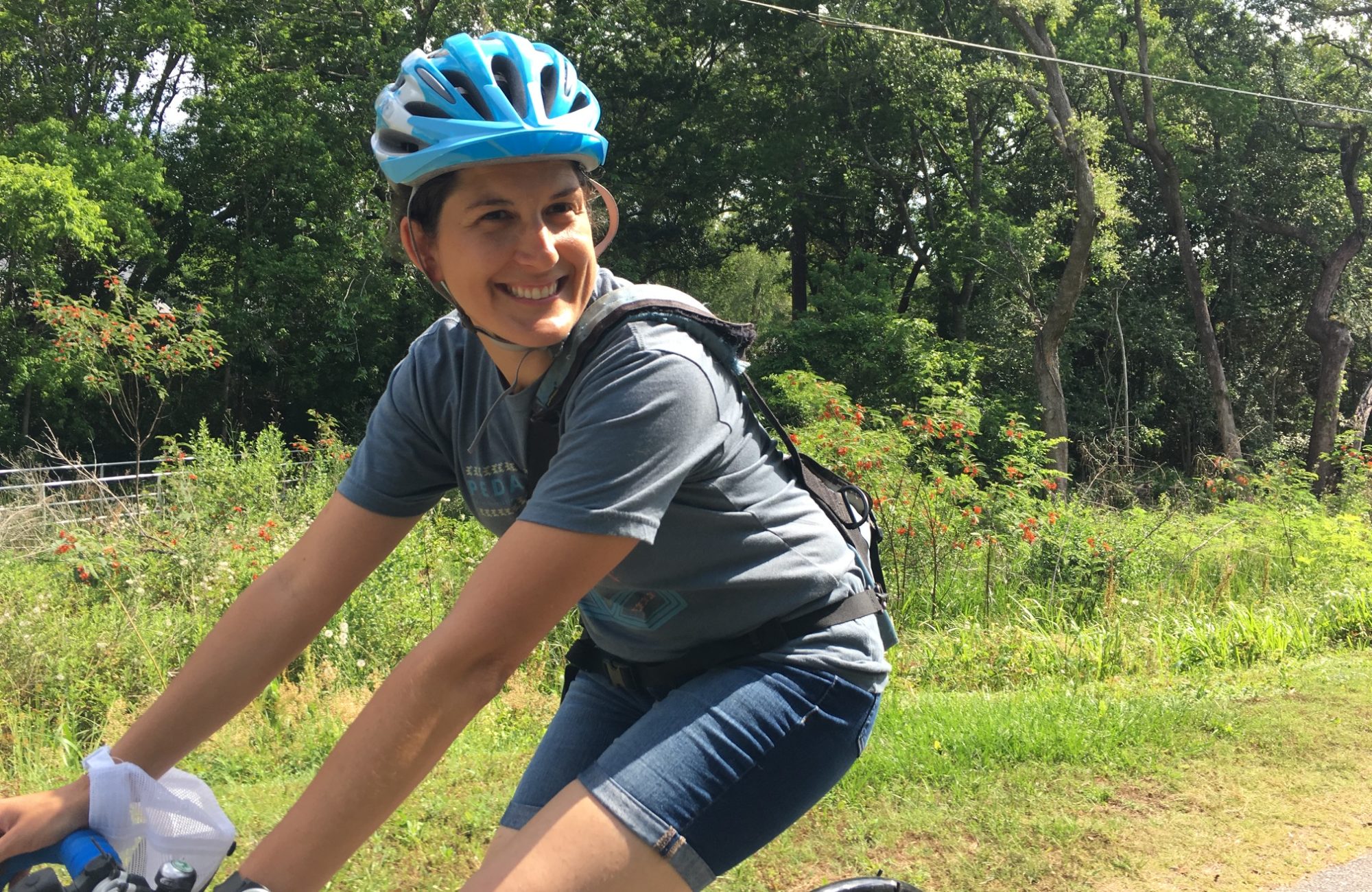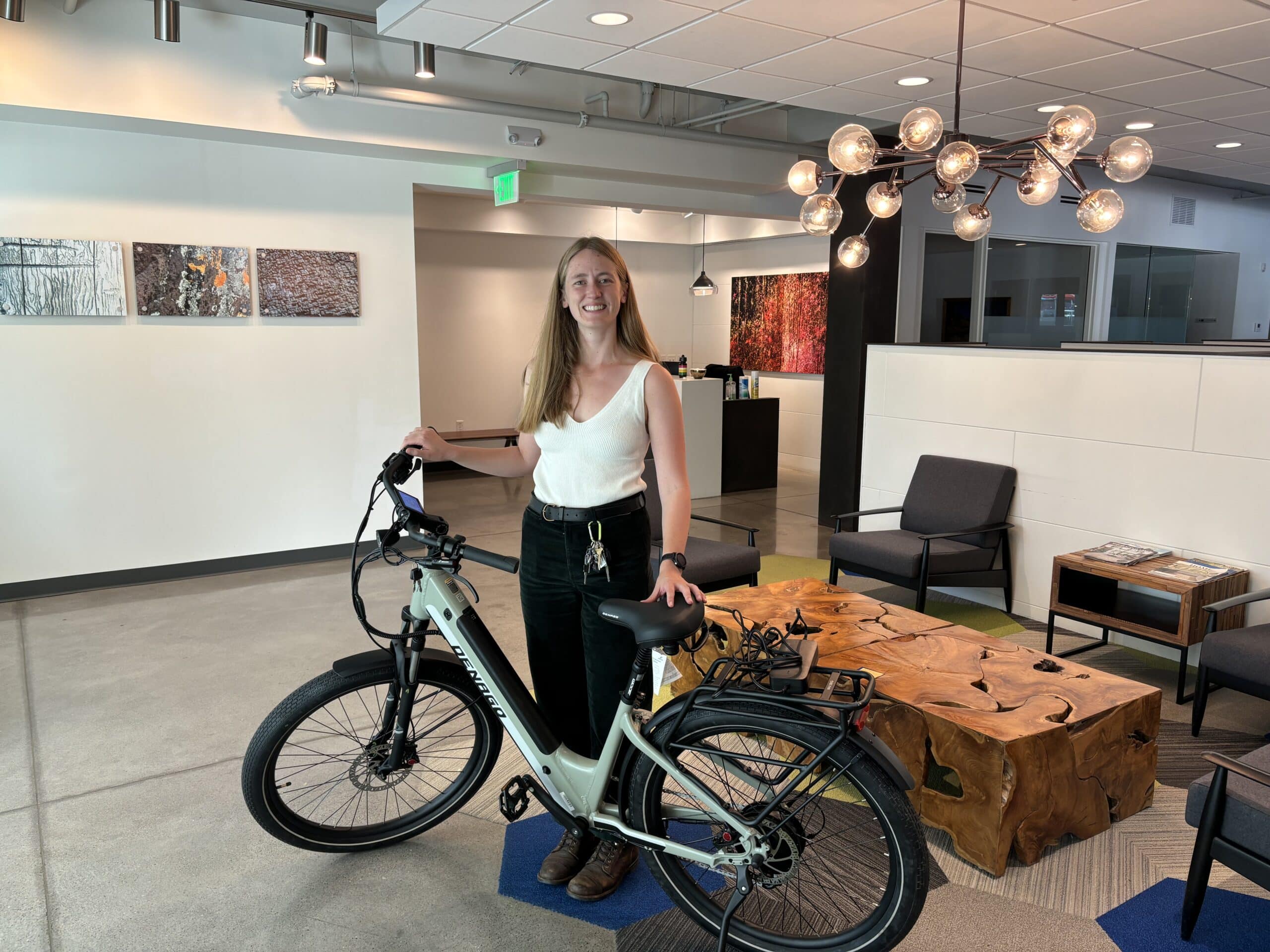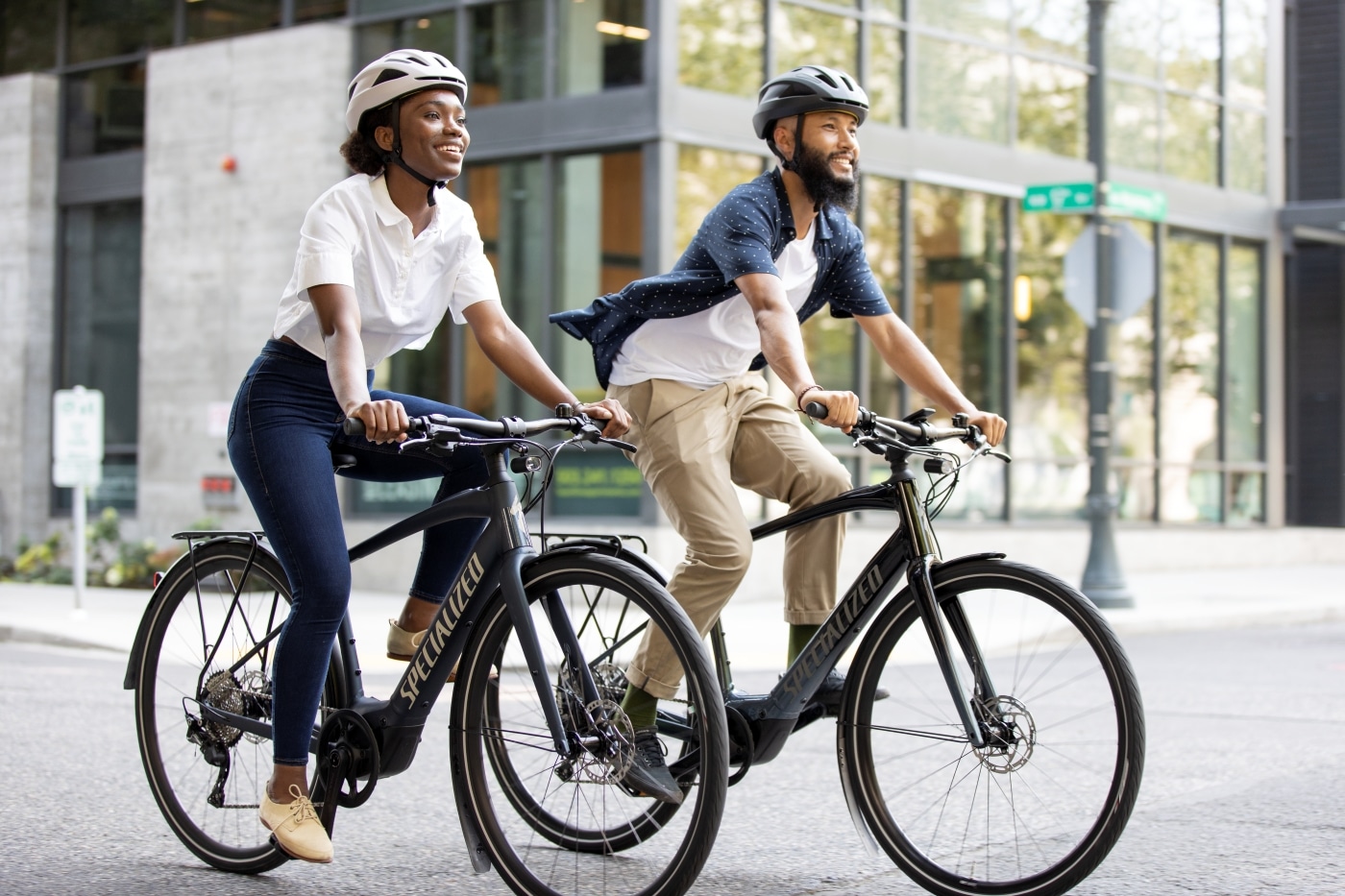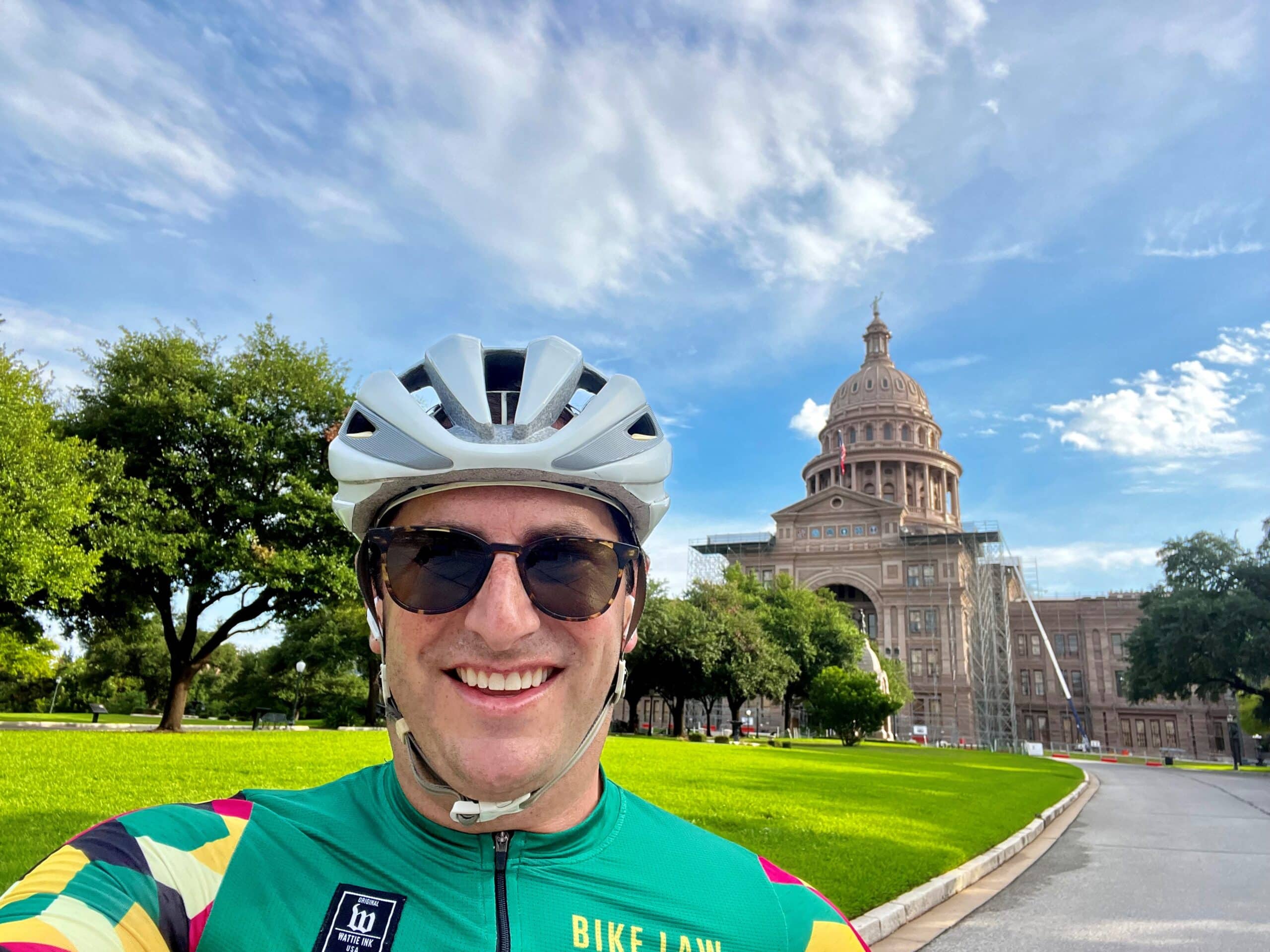Our next Women on Bikes profile is the Director of Charleston Moves: a bike advocate, community activist, and all-around brilliant leader.
It’s not everyday that a small non-profit organization — and by small I don’t mean in stature or accomplishment but rather the number of working staff that can be counted with two fingers — in Charleston, SC gets a U.S. Senator to help secure $18.1M from the Federal DOT for a bicycle and pedestrian lane over the Ashley River Bridge. But this organization is special, and its Executive Director Katie Zimmerman is a big reason why.
Charleston Moves
Charleston Moves “encourages mobility by bicycle, foot and public transit for the improved health and well-being of greater Charleston — its people, neighborhoods, business districts and overall economic competitiveness.”
Their ethos makes sense to us at Bike Law.
“Every day, we work toward a vision of a connected Charleston, allowing the community to choose among many safe ways to travel. When we’re able to ride a bike, walk or use public transit, it means equitable opportunities and better access to affordable food, health care and housing, as well as job security, for citizens. It means an improved local economy. It means opportunities for civic engagement. It means cleaner air and water, climate change mitigation, improved public health, and reduced traffic congestion. Progress is people-powered.”
Women on Bikes: Katie Zimmerman
And every day, at the helm, is Bike Law’s 57 Cannon St. officemate, revered colleague, and inextinguishable female force, Katie Zimmerman. Formerly of the Coastal Conservation League, Katie’s leadership at Charleston Moves and partnership with Bike Law has helped us cultivate a symbiotic relationship between two organizations who serve the same community of people and love to do it with, on, and in celebration of the bike.
Nobody understands its importance more than Katie. And no one works harder to make bicycling a safe and accessible option for all Charlestonians than Katie. Charleston is a transient place (In my 7 years there I met very few people who were actually natives), and Katie is a transplant whom everyone that walks, rides, and has had the pleasure of knowing her hopes that she will call the Holy City her home forever.
Its people need better, safer, connected infrastructure, functional public transit, and they deserve equitable access to those options.
“I don’t think movements can be successful without having as many different types of people as possible. If you are missing perspectives in your campaign, whether it’s to get more bike riders, or to get better bike lanes, or to increase funding for public transit, things don’t go well when you only have one point of view to consider. Charleston has the highest rate of bike/ped injuries and fatalities in South Carolina, and South Carolina is one of the most dangerous states in the nation for vulnerable road users. We lack basic connected infrastructure for more people to choose to ride and feel safe.”
My 2015 crash was in Charleston. Peter moved there to work with Armand Derfner instead of accepting an associate’s position at a prestigious white collar firm in Washington, DC after returning from West Africa and Switzerland to practice Civil Rights law. Shortly after setting up shop, his brother Jim was killed while riding his bike. His calling over 22 years ago opened the door for someone very special to truly transform Charleston mobility in a way that only Katie has been able.
She found herself in the Lowcountry as a young woman at the College of Charleston.
Katie says, “My family moved every few years for my dad’s job, so I was born in New Jersey, then lived in Stratford CT, Newtown CT, Farragut TN, and Roswell GA. I didn’t get a bike until I was around 7, when we were in Newtown. But I did hop on it right away and pedal off. No learning curve.” No surprise there. If you’ve had the pleasure of speaking with Katie, it’s her commanding wealth of knowledge, witty retorts, and her calming and tempered voice that make her a SPOKESwoman to whom we should all be listening.
While those things make her a formidable leader in the human powered transportation industry, nothing is as compelling as her commitment to living the way that so many people wish they could, but are afraid to try for so many unfortunate reasons.
A Car-Free Life
“I ride for transportation. I am car-free and get mostly everywhere by bicycle. The bicycle is my vehicle for self-reliance. I have not driven a car in about 14 years; I find driving to be panic-inducing and unnatural. I have agoraphobia, and could have chosen to stop going places and insulate myself. But the bicycle opened up my opportunities and my ability to lead a freer life.”
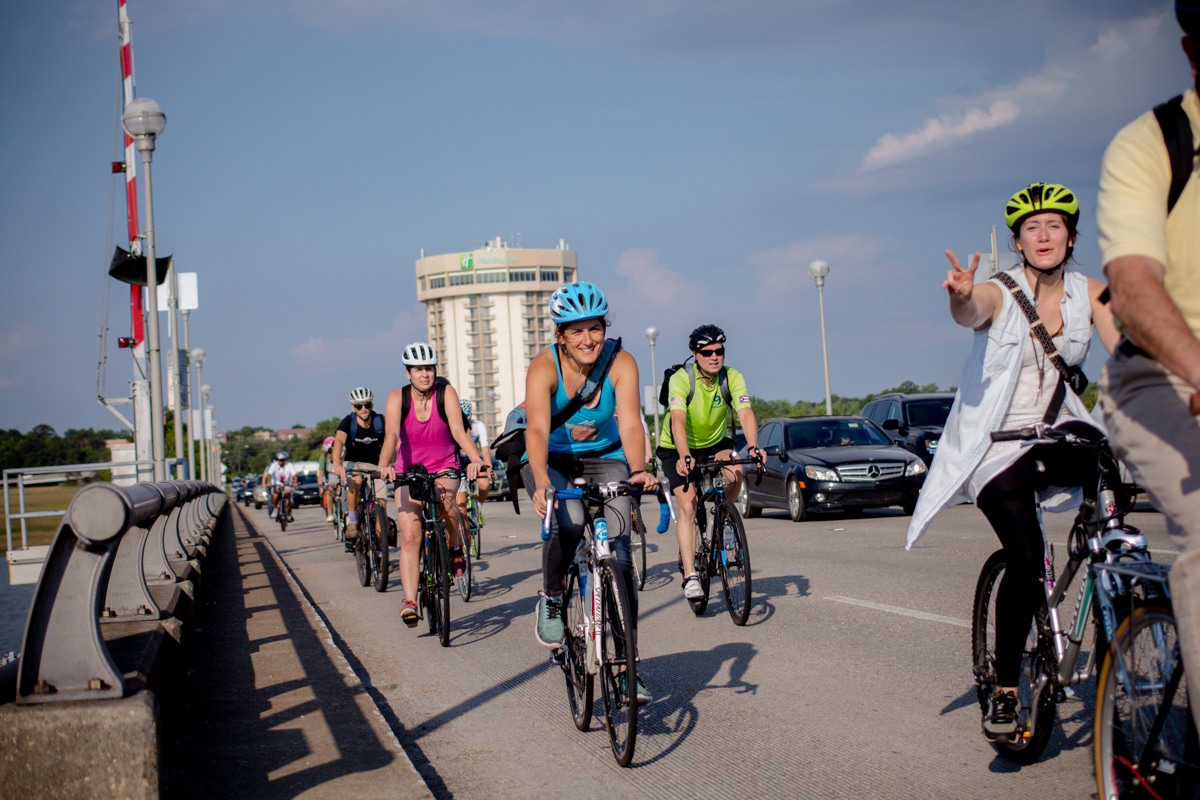
“The bicycle is the great equalizer. It provides access to so many things, from food, to voting, to work. You don’t have to spend thousands of dollars (unless you want to) to have a decent bike and use it for all your needs.” Katie adds that her relationship with bicycling also gives her “accessibility to things that one ignores when they are in a car. I see so many amazing plants and animals on my daily commute that motorists miss.”
And yet she can’t ignore her concern that “I might lose my life doing it.”
Challenges of a Woman on a Bike
Being a woman in the saddle comes with gender-based challenges that are unique to us and our experiences as female cyclists. Katie explains that “motorists try to talk and get too close doing so. There’s an assumption that I’m more available for whatever they need because I’m not enclosed in a car. People ask for directions, yell in my face, harass me, give me “advice” on where I should or shouldn’t be riding, but it’s all quite close and I suspect they would not do so if I was in a group or was not a woman.”
“I had one man, at a red light, pull his car into my personal space and advise me to get involved with the local bike advocacy organization (of which I am executive director).”
It’s hard for me to ignore the part where she made my feminist-activist-advocate ovaries tingle when she told me about her response:
“I thanked him for the tip.”
(This is the part where I wish you could hear Katie’s voice.)
So what can we do to improve things for ourselves, other women in the saddle, and for Katie? Well, for starters she says, “We need more women involved in every level of biking: planning, installation, riding, speaking out.” We need “more and better infrastructure for vulnerable road users. We are simply not valued as citizens in the community. Our requests for better infrastructure are considered frivolous.”
When I asked her what she thinks precludes other women from joining her in the saddle and from fighting the good fight for equity and respect without demanding it from behind the wheel of a car, Katie said, “I suspect they feel either unsafe or not knowledgeable. They see the lack of infrastructure and are nervous about the risk. Or they aren’t sure where to start and maybe feel like bike shops are intimidating. Perhaps many who have children feel guilty about riding a bike instead of being with the kids, and feel it’s not safe to take their children riding with them. It’s probably very similar to why more women don’t run for public office–they fear they are not qualified or don’t have time, whereas that rarely stops men.”
Anything else?
“Misogyny. That misogyny appears in many forms, whether it’s around the table during transportation planning meetings, or the installation of infrastructure that is inherently unsafe for women, or the treatment of women when we ride.”
Say it again, KZ.
She continues to offer a possible step in addressing these problems by saying that, “Perhaps, maybe having a regular Q&A forum for women to ask anything would help. There are all sorts of things that I think we’re afraid to ask about when we first start riding, ranging from specific pain we may get and how to mitigate it, to how to quickly clean up when you bike to the office, to weird experiences on the road.”
This is something we can do today and everyday. We can open ourselves up and thereby the opportunity to live a happier, healthier life in which the bicycle is the preferred mode of safe transportation for all cyclists, especially women. And there’s no time like the present.
Women’s Cycling Day is a movement, not a moment. And the variety, vibrance, and vitality that women on bikes bring to our trails, mountains, tracks, and roadways are the key to solving all of our greatest problems. Because bicycling is the fastest way to save the world.
A Funny, Smart, and Fearless Feminist Leader
Katie puts it all in perspective when she says that “this year’s events are the product of systemic racism and disparities coming to a head. It has reinforced my view that the prioritization of safe, connected and equitable spaces for people to bike, walk and use public transit is the key to solving most, if not all problems our country faces. We have a transportation system that is not accessible to all, and that needs to dramatically change.”
It’s not every day that tiny non-profit organizations in Charleston, SC find fearlessness and a different kind of feminism in a leader and advocate for humanity like their ED, Katie Zimmerman. And there aren’t too many women who are as brave as she is. That are as composed as she is. That are as funny and smart as she is. And that don’t need to shout to be heard.
So if you’re ever in the Lowcountry, and you happen to see this amazing woman riding her bike along the Greenway or over the bridge that will now be safe for all of us who are reading this and the thousands of others who needed her calm, tempered voice, offer a friendly wave with gratitude.
Fighting the Good Fight
In 1975 Abba wrote a song about two Freedom Fighters:
There was something in the air that night
The stars were bright, Fernando
They were shining there for you and me
For liberty, Fernando
Those who know her well know that she’s named her bike Fernando. And I think it’s fitting.
Keep fighting the good fight.
Keep riding, Katie.

Rachael Maney is the Director of the Bike Law Network and of the non-profit Bike Law Foundation.
